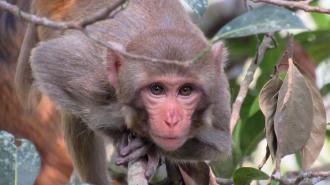A single shot of klotho, a protein linked to longevity, boosted older monkeys’ working memories for at least two weeks — the best evidence yet that it may be able to combat age-related cognitive decline in people, too.
The challenge: As we get older, we tend to experience a decline in our working memory, the system in our brain that temporarily stores small bits of useful information, like where we last parked our car.
Problems with working memory are also common in people with neurodegenerative diseases, such as Alzheimer’s and Parkinson’s, and currently, there’s no straightforward pharmaceutical way to reverse this decline (though brain stimulation is showing promise).
“This could suggest potential applications for treating human cognitive disorders.”
Marc Busche
The klotho protein: In 1997, pathologist Makoto Kuro-o discovered that mice with a genetic mutation preventing the expression of a gene he called “klotho” showed signs of premature aging. He later demonstrated that overexpressing the gene extended the lifespan of mice.
Since then, other studies have found that klotho protein levels tend to decrease with age in humans (and monkeys), that they tend to be lower in people with Alzheimer’s, and that injections of the klotho protein can improve cognitive function in mice.
What’s new? Researchers at Yale and UCSF have now tested klotho injections in non-human primates for the first time and found that they significantly improved older monkeys’ working memory.
“Given the close genetic and physiological parallels between primates and humans, this could suggest potential applications for treating human cognitive disorders,” Marc Busche, a neurologist at University College London, who wasn’t involved in the study, told Nature.
The improvement in working memory was sustained over two weeks.
The study: To begin, 18 rhesus macaques — with an average age of 22 years, roughly equivalent to age 65 in people — completed a test of working memory that they were all familiar with from previous studies.
During it, the monkeys watched a researcher place a treat in one of several compartments. After having their view of the compartments temporarily blocked, the monkeys then had to identify the one containing the treat.
They completed the task about 20 times during the test and got it right about 45% of the time — this was consistent with their working memory performance prior to the study, according to the researchers.
The treatment: The monkeys then received a single injection of the klotho protein. The dose was about five times their baseline levels and brought their total levels up to roughly what they’d be expected to have at birth.
They then completed the memory test again, and this time, they identified the right compartment about 60% of the time. The monkeys were tested multiple times over the next two weeks, and the improvement was sustained.
“Moving to human clinical trials can’t happen fast enough.”
Dena Dubal
Black box: While this study suggests that klotho may improve working memory, the researchers don’t know how or why — it doesn’t seem to cross the blood-brain barrier, so their best guess is that it improves the connections between neurons.
Whether the effects of the treatment eventually wear off is unknown, as is whether follow-up injections are as effective. The ability of klotho to improve memory in monkeys with neurodegenerative diseases is also still a mystery.
Looking ahead: The researchers are now working to better understand klotho’s effect on the brain, but believe the work they’ve done already is enough to justify clinical trials, given the urgent need for treatments to combat cognitive decline.
“We know that it works in a brain like ours,” senior author Dena Dubal told Wired. “[M]oving to human clinical trials can’t happen fast enough.”
We’d love to hear from you! If you have a comment about this article or if you have a tip for a future Freethink story, please email us at [email protected].






